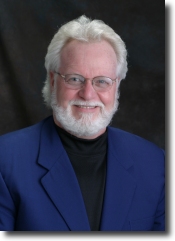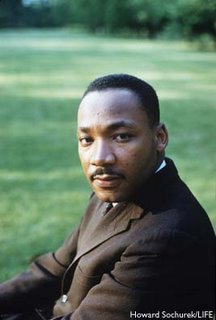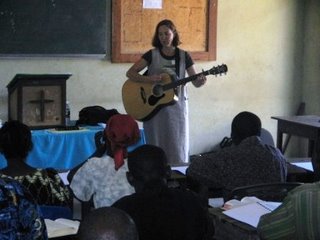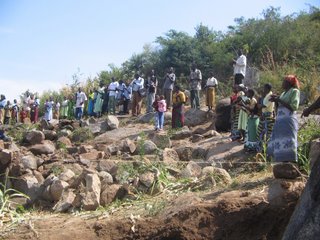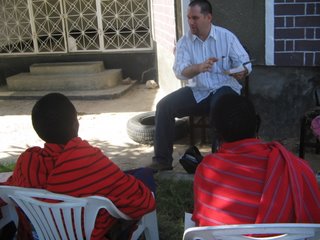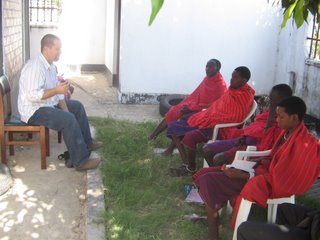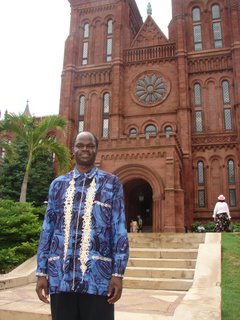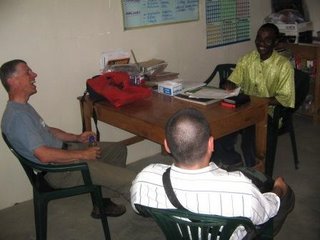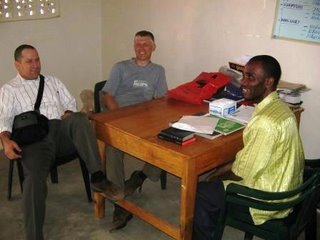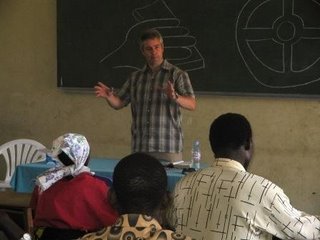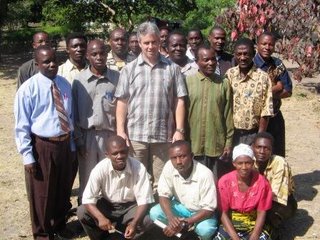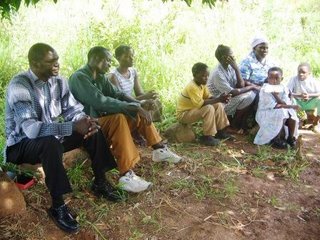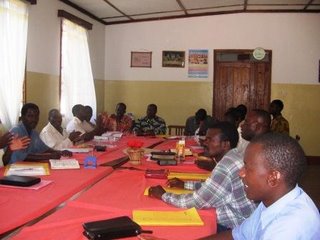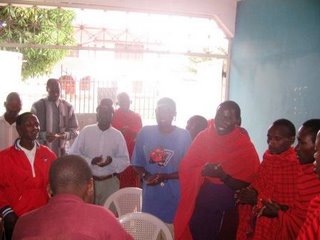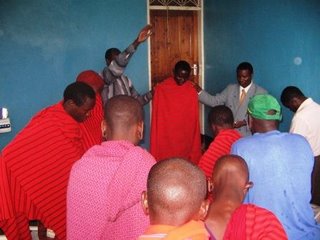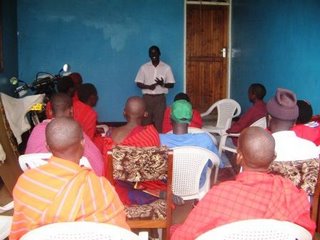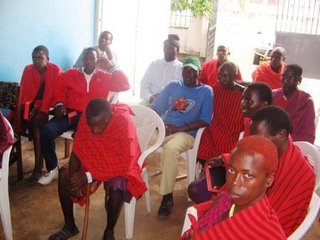
Beautiful Belief
On behalf of the Florida Conference I wish to express my appreciation to the Sherman family and to the Candler School of Theology for the Sherman Scholarship program. This generous trust makes it possible for Floridians as well as others to receive a theological education and vocational foundation in one of the most distinguished schools of theology in America. As a General Superintendent, I want to use this occasion to share reflections about the church’s confession of its belief as part of its mission.
I wish to speak to you tonight about "Beautiful Belief." At the outset, I need to define what I mean by ‘belief.’ The primary meaning of ‘belief’ for Christians is personal trust in the mystery of God’s self-giving revealed in Jesus Christ through the energy of the Holy Spirit. Yet there is also another way of defining ‘belief.’ It may also mean the doctrine of the church that represents the consensus of the global church over time about how to interpret the cognitive content of the revelation of God. As I speak about ‘belief’ I am referring to the doctrine of the church that is taught rather than the phenomenon of personal trust.
Usually when we think of Christian belief we do not understand it as an object of beauty. We tend to think of belief as being true or good, but not as being beautiful. The truthfulness of Christian belief is usually our primary concern. We want to know if a belief taught by the Church is true and how we can say it is true. Occasionally we are concerned with the goodness of belief. We want to know if it is good, i.e., good for us, to believe what the church teaches. One of the most important books of the last ten years is Ellen Charry’s By the Renewing of Our Minds: the Pastoral Function of Christian Doctrine (New York: Oxford, 1997). She demonstrates how believing Christian doctrine has a salutary effect upon our attitudes and our behavior. Likewise, Episcopalian Bishop C. FitzSimmons Allison makes the same point in his book The Cruelty of Heresy (Harrisburg, PA: Moorehouse Pub., 1994). Allison demonstrates that the heresies of the church are dangerous not only because they are not true, but also because they are cruel: they mislead people into attitudes and behavior that are destructive for them. So then, while we may judge Christian belief according to the standards of truth and goodness, we rarely consider Christian belief from the perspective of beauty.
Swiss Protestant theologian Karl Barth was the first in the modern era to consider the beauty of belief. In his discussion of the doctrine of God in the Church Dogmatics (Edinburgh: T. & T. Clark, 1936-1977) Barth concluded his explication of the attributes of God with the question, Can we also say God is beauty? He answered, yes. Barth went on to say that the beauty of God must be understood according to the biblical witness to the glory of God. For Barth, it was necessary to make a distinction between ‘glory’ and ‘beauty’ because ‘glory’ refers to the transcendent beauty of the God of freedom whereas ‘beauty’ may be understood only in terms of a delightful perception of form in worldly realities. Nevertheless, once he acknowledged that divine beauty is a manner of testifying to God’s glory, Barth affirms that we can say that God is beauty because speaking of God’s beauty is a way of perceiving who God is that cannot be said any other way. Barth has provided an enormous service to the church by recovering an emphasis upon God’s beauty that had been neglected by Catholic and Protestant theologians for centuries.
There is one 20th century theologian, Hans Urs von Balthasar who made beauty the central perspective by which to understand Christian belief. Balthasar, a Roman Catholic theologian, lived in the same city in Switzerland as Barth. He affirmed Barth’s insight about the beauty of God, and then proceeded to write a whole theology based on the perspective of beauty. His theological aesthetics is the seven volume series titled The Glory of the Lord (San Francisco: Ignatius Press, 1983). Balthasar said there are three transcendentals, faith, goodness, and beauty. While all of these are related, beauty is often neglected in the church’s teaching of its beliefs. In order to correct the imbalance, Balthasar wrote The Glory of the Lord to demonstrate what Christian belief is when it is seen from the perspective of beauty.
Balthasar’s own work has inspired the group of British theologians known as the school of "Radical Orthodoxy." The leader of that school, John Milbank, has written about Christology as poetics in his book The Word Made Strange (Cambridge, MA: Blackwell, 1997).
The works of these two Swiss theologians, Barth and Balthasar—one a Reformed theologian of the Word, the other a Catholic philosophical theologian and arguably the two greatest theologians of the 20th century—should inspire those of us who are not academic theologians to reflect more on the beauty of Christian belief.
When I refer to the beauty of Christian belief I am not thinking primarily of the styles in which it is presented. I am not thinking about literary skills in writing, eloquent rhetoric in preaching, or the employment of all the arts in worship. Attention to style by Christians is important and there should be much more of it. Primarily I mean that the beauty of Christian belief is the attractive charm of the divine revelation itself. It is the story of God’s disclosure of God’s self in God’s revelation to Israel culminating in the coming of Jesus Christ as the unity of God and human being that is beautiful. It is no accident that the Greek word charis may be translated as both ‘grace’ and ‘charm.’ The grace of God fully disclosed in Jesus Christ is charming, and it casts its spell upon us in a way that attracts us.
I submit that the mission of the church to make disciples of Jesus Christ in the postmodern world requires us to teach Christian belief as beautiful as well as true and good.
There is an obstacle that the church must learn to overcome if it is going to be able to present beautiful belief to people in order to invite them to become disciples of Jesus Christ. That obstacle is a set of habits that the church acquired in the Western world as it tried to respond to the Enlightenment. The Enlightenment, the intellectual movement that began in Europe in the 18th century, is characterized by a rationalistic interpretation of reality. Combined with the scientific method, the view of the world engendered by the Enlightenment is one in which only that which can be comprehended by human reason or observed by the human senses can be legitimized as ‘real.’ In England, this movement was known as deism; in France, illuminism; and in Germany, Enlightenment. Immanuel Kant raised the challenge of the Enlightenment in Germany when he exclaimed, "Dare to know! Have courage to use your own reason!--that is the motto of the Enlightenment."
As the church responded to the Enlightenment, it tried to accommodate the Enlightenment’s dogmatic assumptions about what is real. In other words, the church went on the defensive by conceding too many of the claims of the Enlightenment. The consequences of the accommodation were two-fold. The church tended to succumb to reductionism; that is, it reduced its views of reality to fit the presuppositions of the Enlightenment. It leaned toward disavowing miracles and pushing divine revelation out of history into a realm of ideas or inner experiences. Also, the church tended to embrace deconstruction as a method for determining the truth found in Scripture and in its creeds. The church in the West assumed that if reality is as the Enlightenment says it is, then we must deconstruct the story in the Bible and try to find out what really happened, and we must also deconstruct the creeds of the church in order to recover the simple gospel, which must consist of the teaching of Jesus about love or the coming history of God’s reign of justice and peace. I realize I am over-simplifying, but it is necessary to grasp the story of how the mind of the church changed in its engagement with the Enlightenment. Whatever you may say about the church’s belief as a result of its encounter with the Enlightenment, I think you might agree that reductionism and deconstruction are not the ways to beautiful belief. There is something grotesque about the appearance of Christian belief once the jaws of reductionism and deconstruction have mangled it.
Rather than dealing directly with the claims of truth posed by the Enlightenment, I want to go in another direction. I agree with many who perceive that the claims of the Enlightenment are no longer normative for postmodern people. People today still give room to reason and science—as they ought—but they are no longer willing to allow reason and science all the room on the field of human inquiry into the truth of reality. Postmodern people assume that there are mysteries that transcend the capacities of human logic and human observation. In her book Winter Hours, (New York: Houghton Mifflin Co. 1999) the poet Mary Oliver spoke for many when she wrote,
"Knowledge has entertained me and it has shaped me and it has failed me. Something in us still starves. In what is probably the most serious inquiry of my life, I have begun to look past reason, past the provable, in other directions. Now I think there is only one subject worthy of my attention, and that is the recognition of the spiritual side of the world, and within the recognition, the condition of my spiritual state."
This openness to look past reason, past the probable of which Mary Oliver speaks is the mindset of many postmodern people. Whatever else the obscure label ‘postmodern’ means, it means that we are living in an intellectual climate that is post-Enlightenment.
Given that we are living in a new cultural context it will be more possible to teach Christian belief as participating in the true, the good and the beautiful.
I wish to suggest the new habits we must practice in order to teach Christian belief as beautiful. I am going to be merely suggestive, but I hope my suggestions point in the direction of the church learning how to teach beautiful belief.
First, there must be confidence in the Christian creed. The creed of the Church is the summary of its primary beliefs. The ancient Church called this summary the "rule of faith" or the "canon of truth." The summary finds its classic expression in The Apostle’s Creed and the Nicene Creed. The creed is the summary of the cognitive deposit of the revelation of God.
There are signs that the church is recovering its confidence in its creed. Christianity is growing most rapidly in Africa, Latin America and Asia, and in all these places the church has confidence in its creed. Even in the Western world there is increasing evidence that the brightest and most competent scholars take seriously the claims in the creed. I suspect that part of the reason for this is a new sense of liberation from the reductionist and deconstructionist presuppositions of the Enlightenment.
The creed is essential to beautiful belief because it is a particular aesthetic form—it is drama. The cognitive content of divine revelation is presented as a story or a drama. In this case, the drama is the divine drama of God’s salvation of the world. The British writer, Dorothy L. Sayers said, "the dogma is the drama." When people are taught what Christian doctrine really claims, Sayers said, they simply cannot believe that anything so interesting, so exciting and so dramatic can be the orthodox creed of the church."
Hans Urs von Balthasar followed The Glory of the Lord with a five-volume discussion of Christology titled Theo Drama (San Francisco: Ignatius Press, 1988). Balthasar interprets the event of Jesus Christ in the context of the theatre. The dramatic beauty of the gospel cannot be unveiled until the Church recovers its confidence in its creed.
The second thing that has to happen to perceive and to communicate the beauty of belief is there must be a synthesis of symbols. Anyone who compares the theological writings of the church fathers with many contemporary theologians will notice how much more the church fathers relied upon symbols in their preaching and teaching. One reason may be that most of the fathers were bishops or teachers in the church whereas most theologians today are academicians. Beyond a difference in social location, it seems that the ancients understood better than we the power of symbols.
You might describe the preaching of the ancients as a poetics of the creed. The poet Seamus Heaney describes poetry as "a source of truth" and at the same time "a vehicle of harmony." The same could be said of the speeches and writing of the ancients. They used symbolic rhetoric to elaborate the meaning of the creed in order to present the Christian faith as a harmonic whole without compromising the truth of the divine revelation in the witness of the prophets and apostles. The church fathers and mothers use of symbols such as the symbols of the descent and the ascent of the incarnate Word of God reveals the power that lies in symbolic speech.
Just listen to some of the famous rhetorical gems typical of the Church Fathers. Irenaeus said of Jesus Christ. "He became what we are in order to enable us to become what He is." Gregory Nazianzen said, "The Son of God deigns to become and to be called the Son of Man that the incomprehensible might be comprehensible." Leo the Great said, "He who became man in the form of a servant is he who in the form of God created man." These sayings bring delight to the mind and even pleasure to the body through the organ of the ear.
I view the Fathers’ symbolic speech as being based upon a synthetic method. They are taking the basic beliefs found in the scriptures and the creed of the church and organizing them into a synthetic whole. It is just the opposite approach to that taken by deconstruction or de-mythologizing, which too often is characteristic of a modern interpretation of Christian belief.
The kind of theology that is a synthesis of symbols is still characteristic of much Eastern Orthodox theology, which is, of course, directly dependent on the church Fathers. I like to compare the notes in The Orthodox Study Bible with those in The Oxford Annotated Bible and The New Jerusalem Bible (NJB). In the notes on Mark 1:9-11, which is the brief report of Jesus baptism, The Oxford Annotated Bible only cities other biblical references and merely comments on the word "Beloved" in the statement, "You are my Son, the Beloved; with you I am well pleased." Oxford says, "Beloved, similar in meaning to chosen (Is. 42:1), refers to an act of will rather than of feeling..." By contrast The Orthodox Study Bible says,
"By saying He came up from the water, Mark suggests Jesus was immersed in water. Christ’s rising from the water is symbolic of His ascension, since the same Greek verb is also used to refer to that event. The church Fathers taught that in coming up, He lifts the whole world with Him. The Spirit descending upon Him foreshadows the Spirit’s descent upon the first Christians at Pentecost. ‘Like a dove’ does not mean the Holy Spirit is incarnated as a dove. Rather this is a special sign indicating the presence of the Spirit. A dove symbolizes purity, peace and wisdom. The voice of God the Father from heaven makes Jesus baptism a manifestation or epiphany of the Holy Trinity. The Father is not adopting Jesus as His Son, but proclaiming that He is and always has been His Son. The divine proclamation, combining a messianic Psalm (Ps. 2:7) with the first song of the Suffering Servant of the Lord (Is. 42:1), reveals who Jesus is. Thus Jesus’ baptism anticipated His Transformation and Resurrection, the dawning of the new creation."
The NJB has no notes on Mark 1:9-11.
The purposes of these study Bibles are quite different. The Oxford refers to the best contemporary Protestant scholarship. The NJB represents the best contemporary Roman Catholic scholarship, and the Orthodox Study Bible represents an interpretation of scripture in light of the Great Tradition of the Orthodox. Nevertheless, the ability of the Orthodox Annotated Bible to present a synthesis of symbols in its interpretation of the Bible is striking by contrast to the Protestant and Catholic Study Bibles.
There are some 20th century apologists who understand the power of symbols. The two best known are G. K. Chesterton and C. S. Lewis. It is probably no accident that both were literary men and laymen as well.
Postmodern people are hungry for symbols. The success of Lewis’s friend J.R.R. Tolkien’s trilogy The Lord of the Rings (Houghton Mifflin Co., 2002) is a demonstration of the attraction of a symbolic world.
Beautiful Belief is an expression of the Christian faith in which symbols are synthesized in a harmonic whole in a way that expresses the beauty of the world of divine revelation.
The third thing that must happen in order to perceive and to communicate the beauty of belief is to make room for the human imagination as a means for illuminating the work of the Holy Spirit in the exegesis of scripture. In theory, there needs to be a recovery of the allegorical method of interpreting scripture. The allegorical method was adopted by Origen around 200 CE, and became characteristic of Alexandrian theology in the ancient church. Origen said there are three meanings in scripture: the physical, i.e., the historical or literal; the moral; and the spiritual. Origen and his followers believed that the letter kills, but the Spirit makes alive. Therefore, they were always looking for the spiritual meaning of the text, especially in the Old Testament, as a way of making the text come alive. The abuses of allegory are well known, and they should not be repeated. Nevertheless, there should be a recovery of a freedom to practice an exegesis that allows room for the Spirit to illuminate the spiritual meaning of the text. Only in this way can preachers relate to the spirituality of the culture.
In Christian Century, Richard Lischer stated,
"More and more preachers are engaged in the spiritual reading of the Bible using methods taught by the fathers, mothers and mystics of the church. One such method is the use of allegory, which instead of constricting the interpreter’s options celebrates the divine abundance within the biblical text. The church ‘settled’ the matter of allegory twice, repudiating it first during the Reformation and a second time in the heyday of historical criticism. Yet the debate over the multiplicity of meanings in text has not gone away, as postmodern interpreters have made clear. Literary criticism has opened our eyes to the multivalency of the texts. Contrary to what many of us learned in seminary, most biblical texts do not broadcast one clear, easily outlined lesson. And theological interpretation, which makes the modest proposal that texts are about God and are meant to be read by church at worship, has opened our eyes to the great galaxy of riches of patristic exegesis, including once-despised allegory."
During the 20th century the focus has been on deconstruction of the text into its many layers of tradition and the history of its words. There is a place for this kind of scientific exegesis, but what this kind of exegesis does not accomplish very well is conveying the theological and spiritual meaning of the text.
Acts 27, Luke’s narrative of the apostle Paul’s shipwreck, provides an example of how one might infer a spiritual meaning from a text. F.F. Bruce, a modern conservative scholar, was quite interested in the theological and spiritual meaning of texts. He acknowledged that some have found allegorical meaning in the story but he quickly adds that these interpreters should "…beware of supposing that Luke had any such interpretation in mind when he penned his narrative." (Commentary on the Book of Acts [Eerdmans 1971], p.498) How can Bruce be so sure? Isn’t this just the convention of modern scholarship prohibiting him from finding allegorical meanings in the story?
By contrast, Hans Urs Von Balthasar states, "Luke is very aware of the symbolism of his narrative."(The Glory of the Lord: A Theological Aesthetics, Volume III: Theology: the New Covenant [Ignatius Press; San Francisco, 1989], pages 542-543) Bathasar perceives that the ship is the early visible form of the church in history. It is going to encounter the storms of persecution and oppression. The institutional form of the church may indeed be splintered and broken. Yet the church has its own soul and spirit, an inner form that is given by God, and these cannot be destroyed. In the shipwreck, it is the Apostle and those who have eaten the Lord’s Supper with him who survive. Here is an indication that even though the institution of the church may be broken, the church as a community based upon apostolic witness will endure. Paul escapes the wreckage by clinging to a plank. Balthasar suggests that the plank represents Christ who carries us on his back through all he storms of time. A careful reading of Acts 27 suggests many images that speak to the meaning of the church as a spiritual community as it moves through history.
I suggest that the apprehension and communication of Christian belief that will attract spiritually seeking people in postmodern culture is one that is beautiful. Beautiful belief is characterized by a confidence in the creed, an ability to synthesize the symbols of the faith, and a willingness to allow room for a spiritual sense of the scriptures.
The early 20th century English novelist and poet Thomas Hardy once described poetry as being akin to religion. This secular poet who rejected Christian belief was like Wallace Stevens who sought the spiritual meaning of life in art. Art is no substitute for religion, but it is true that they are kin. What unites them is what is too often missing in the church: the sense of the beauty of the mystery of Being. The Christian conviction is that the revelation of God in Jesus Christ is not only the divine truth and divine goodness, but also the divine aesthetic that has the power to draw all people to it.
Bishop Timothy W. Whitaker
Florida Conference
Delivered for the Sherman Advisory Board
at the Sherman Scholars Dinner, October 29, 2002.

